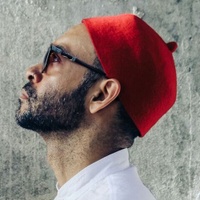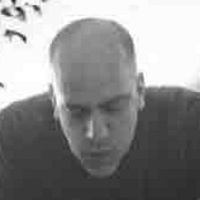As told to Miriam Garcia, 2664 words.
Tags: Music, Production, Collaboration, Multi-tasking, Day jobs.
On not being afraid to try something new
Composer, producer, and musician Otura Mun (ÌFÉ) discusses the surprise of landing on an original idea, some reasons for collaboration, establishing a strong work ethic, and to being of service in what you make.Originally published on March 3, 2022
Besides collaborating with people within your band, you have also worked as a producer with many artists at different stages of their careers. What would you say is key to our fruitful and nurturing creative collaboration?
I suppose what makes a successful collaboration is when I have a clear idea of what I’m trying to do on my side, and who might be able to complement that. For example, in the album 0000+0000 there’s a collaboration on the first track called “Preludio II” featuring Lex, who is a young singer who, to me, sounds like a young Prince. I’m sort of a mediocre singer, and I cannot do the things that Lex does. It might be like 20 years of studying with Lex before I could even scratch the surface of what he does naturally. So I thought it would be nice to call Lex up because I’d like to be around that style of singing and because I can definitely learn from it. That’s bringing something to the table that I can’t, and that is the point of collaboration for me.
For another song called “Fake Blood,” I collaborated with Robby the Lord, who’s a great Congolese rapper. When I was working in the song, I thought it was almost too serious, and wanted to get somebody that could also make it sound very dancehall and rap. I thought that Robby would be a great person because he’d sort of put it in a realm and in a culture that is straight and I’m not capable of doing that.
There was another collaboration with a guitarist named Saint Ezekiel. I don’t play guitar but he does and I needed that. So it felt like I would be able to push my music further than it could go if I reached out to him. And that’s why collaborated together.
I know that there’s a culture of collaboration that’s more about trying to cross-pollinate audiences. And that wasn’t what I was doing on any of that really. I don’t typically make music with people that I don’t respect. I’ve been given lists of people from labels like, “Hey, you should try a collaboration with so and so, and so, and so.” And typically, it’s a snoozefest for me because there’s so much stuff that I don’t like that if I don’t have a natural proclivity to it I can’t find a reason to do it.
Your first record was well received and allowed you to create a solid audience with ÌFÉ. Because of that, were there expectations or pressure you felt when releasing new music?
Definitely, and I think most artists are under this pressure. And unfortunately, you can do something and people have a kind of short memory span. So you put something out, and you might be able to work off of that, depending on how big the explosion was for a couple of years. I definitely felt that I needed to release some more work but I suppose I don’t care so much what other people think. My job and my balance are to be auto-critical enough, or self critical enough to know the limits of what it is that I’m doing. And to know the value of my ideas. Do enough research, and be honest with myself so that I avoid delusion.
For example, on the first album I knew that I had an idea, and I was able to convert on an idea. Which is basically how to make hand percussion electronic in a way that no one else had done, or at least no one else had documented ever. So it was “an original idea,” and that’s very rare. I knew that I had it and I captured it on video. I made an album of that stuff too. But the reason why people knew about it was that captured it on video and I sent it out. And that was enough for me to be able to travel the world three times.
Now, I feel that you can’t rely on that same thing again. Because I’ve already had the idea and it showed proof of concept. Now it’s more about what can I do with it as opposed to, “Has anyone done it before?” And that’s kind of where I tried to lean on for this new record. It was to show what I’ve been able to do with it over the last few years, and sort of the potential of this approach to making music. At the end of the day, I thought that if I could ramp that up, and also really double down on where I needed some work.
Before “House of Love,” which is the first single that I put out, I’d never written a song . I never sang a song but with it, we went on tour the first time with ÌFÉ before I had written the record. I’d never performed on stage singing. I’d always produced for other singers and rappers. So it was a big step for me. So this time around, when I got into the studio to write the second album, I wanted to do things that I wasn’t capable of doing. And it may have taken me a year to get the right vocal delivery on a song. Because I was not used to singing in a full voice. I didn’t recognize what that voice even sounded like. But I knew I wanted it. So it took me a while. And there’s no way around that you can’t collaborate your way through better singing, you just have to get it. And it’s the same way with drumming or whatever.
There’s a certain amount of personal sacrifice that I think I had to go through in order to make this album, and the first album, too. And those things take time. There was definitely pressure around it. But I didn’t feel pressured to deliver X, Y, and Z, because I have to deliver for myself. And if I feel that I’ve progressed as an artist, or I’ve done the things that I need to do in order to move my artwork forward, then again, it’s my criteria. And I have to believe that I’ve done so. And whether it’s critically well received in that way, I don’t have much control over that. But I can tell you that I believe that it grew.
Do you remember that day or that time when you found that you created something original, or new as you just mentioned? What took you there?
I got there because I wanted to do something, which was to play electronic music live in real time because I was bored with electronic music. I had already opened up for Justice, and I’d seen the “Big Light Show” and the two guys behind the table. But it was boring to me because they weren’t doing anything, as far as I know. I DJ’d for a living for a long time, I know the limits of that. I appreciate the sonics of electronic music. That’s what I love. But I don’t like the playing, because I grew up in the era where if you weren’t a band that could get on stage, and play for two hours, and just rip the face off of the audience, you were worthless. I wanted to figure out how to do it live. And there was no acceptable way of playing what I wanted to play live. I couldn’t program it either. I knew the type of music that I wanted to make, what it sounded like. But when I tried to program it as a producer with the samplers, and the sequencers that I had made music with five years earlier, I was bored. I felt like, “No, my mind wants to move faster than these machines can move. And they want to do more variations that I could program. It has to be live.”
So I stopped producing anything for a couple of years and just studied Cuban Rumba. I knew that Cuban rumba was a music that I would have enough desire to play and that I was disciplined enough to study it. But I also knew that the conversation rhythmically was rich enough that if I learned it, I could then deconstruct it, and do something live with it.
And as I was going at it, I thought I had an inkling that I could put triggers on drums, and play them. The problem was that I didn’t understand Cuban Rumba well enough to be able to do it myself. And the people that were around me were great Cuban Rumba players, but they didn’t care at all about electronic music. They were not interested in the same things that I was interested in. And in this sense, what I needed them to do was to be able to execute these patterns in a way that would make sense. But before I know what made sense, I had to know the language. And it took me, let’s say three years of practicing from 9:00 AM until 9:00 at night, six days a week, for me to be able to understand the language. I’m a mediocre Rumba player. It took me that long to understand the language. So I think the entry level is probably something that a lot of people aren’t willing to do. And I just happen to be willing to do it. I also had to have the resources to do it. And that’s what I suppose makes it. Beyond having an original idea, the idea then sinks in, and does something that maybe you wouldn’t expect it to do.
You had a successful career as a DJ and decided to leave that behind. You also were willing to work and master something that was foreign to you. What do you think helped you to keep moving and not quit?
I think in the initial state, it would’ve been the excitement about having something that was my own, and that I felt would be fun to do. Because I saw the potential of it and how exciting it could be and I knew that other people would be excited about it. At that time, I felt like I didn’t have anything of my own. I was at a place where I didn’t owe anybody anything. It was almost like that midlife thing where you’re like, “Okay, well, I’ve done this. I have a chance to change. What do I want to do?”
And the music that I wanted to make changed as well. I wanted to make music that was somehow of service to people. And I was really into that idea, whereas years earlier, I just didn’t even really care. I could have done amazing music in my house. But now I felt whatever I did had to be of service.
The excitement around what could be was enough. I went to California and I started working in illegal weed farms. And I worked in farms for like six months out of the year, for five years in a row. And this was before it was legal. I don’t come from money and I had to buy the equipment to try my ideas out. So I did that. And I had to also pay rent while I learned how to play Rumba. So for just two years, I did that. I went and basically did something that no one would suggest doing, in order to get the money to be able to invest in my ideas. I did that for about five years. Now, I think it was not worth it, necessarily, for me. Because I’m not financially better off than I was. I have a lot more equipment and I was able to travel. But at the end of the day, it really does come down to somebody from Italy that hits me up and says, “Hey, I don’t speak English Spanish, or whatever else you’re singing in. But I hear your music, and I have stage three cancer. And when I listen to your music, it makes me feel better. I just love your music. Thank you so much. And that email is enough. That was what I wanted to do. I wanted to make music that was of service to people, and that could bring hope and love to people. And that’s it. So I feel like all the sacrifice has been for something. And that’s good enough for me.
Could you elaborate on what you mention about making music that could be of service to people and how do you reach this artistic goal?
Well, for example, I think this last record seems political, but at its roots, it comes from someone who’s interested in human wellbeing. I feel that, as an artist, it’s my responsibility to tell the truth about the day that we’re living, and the world that we live in, and who we are as a people. I definitely try, and do that in a more upfront way in this record. But it’s only because I think that that music is about love. And love is what connects people. And is what enables what is also called compassion.
With both ÌFÉ’s albums, there’s a lot of prayer in the music. And I think that’s probably what people feel immediately in the music. Although they might not be able to identify it. And on a simple level, prayer is just taking intention, and focusing it, and then pushing it out of your mouth, in a way that people can hear it. What you say and the intentions that you put in your mouth can affect you in ways that are beyond people’s understanding to a certain extent. And that’s essentially what prayer is. So my music is littered with prayer. If you’re listening to music that is constantly praying for human elevation, and you might not understand the words, but the intention and the intensity are still there.
I would say that people that listen to Aretha Franklin, and can’t speak English, can hear the meaning, and the depth of what Aretha’s delivering. Now, where did Aretha learn to sing? She learned to sing in the church. And so people that are trained to perform religious music, are keenly capable of being able to deliver this type of delivery that captures what some people might say, “The human soul, or speaks to the human soul.”
Is there a habit, or ritual that helps you move through a creative block or when you are feeling stuck and uninspired?
When I start something, I’ll explore it. And nine times out of ten, I’ll end up using it for something. If I start tinkering with something, it’s going to become something eventually. There’s a painter named Kerry James Marshall, who talks about what he was doing as he was mastering his craft. And he basically says that for 20 to 30 years, he never stopped painting. And that’s basically my method. I’ve always been making things. I have to basically have a five-month hiatus because I’m trying to put a band together and tour and blah, blah. But I’m constantly making notes. I’m constantly creating. And that’s the only way that I’m able to grow. Because I’m not a genius. I’m not overly talented. I just have a crazy work ethic. And I’ve been at it for a long, long time.
Otura Mun Recommends:
El Espíritu de la Rumba by Yoruba Andabo
Donde Andabas Tú, Acerekó? by Los Rumberos de Cuba
The Fire Next Time by James Baldwin
Our Latin Thing (Cosa Nuestra), Fania All-Stars Documentary (1972)




